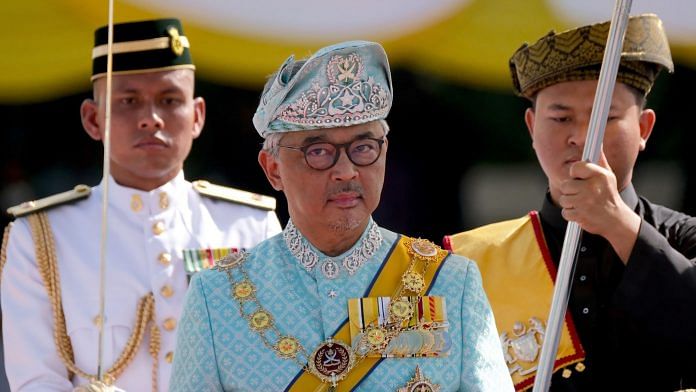Kuala Lampur: After decades in the background of Malaysia’s national politics, the monarchy has moved to center stage to fill a power vacuum this year.
King Sultan Abdullah Sultan Ahmad, who ascended the throne last year, stepped into the political fray back in February when a two-year-old government abruptly collapsed. He resolved the impasse by tapping Muhyiddin Yassin to become the next prime minister without a parliamentary vote. Since then Muhyiddin’s majority has regularly been questioned, and the country’s top politicians have sought meetings with the king while vying for power.
For Malaysia, where one coalition ruled for six straight decades until the 2018 election, it’s relatively new for the monarch to play such a prominent role in politics. The nine members of the Conference of Rulers, who rotate power among themselves, have since the country’s independence from British rule mainly performed ceremonial functions like swearing in ministers or pardoning criminal convicts.
But now, with Muhyiddin’s government holding at best a two-vote majority in parliament, the king’s decisions have become crucial in determining whether his administration stays or goes. The monarch has the constitutional power to appoint a prime minister or deny a request to dissolve parliament for an election, which in normal times merely confirms the outcome of a vote or the sitting government’s recommendation.
The lack of a clear mandate for the current prime minister now gives the king more weight, including when he makes statements on policy matters like the budget or the right coronavirus response.
“We have now a royalty becoming more prominent, more assertive in politics,” said Johan Saravanamuttu, an adjunct senior fellow at the S. Rajaratnam School of International Studies who has written about Malaysian politics for more than 30 years. “It’s actually making important decisions with respect to politics.”
The king’s influence will be tested in the next few weeks. He’s expressed “full confidence” in Muhyiddin’s ability to lead the country through the crisis and urged lawmakers to vote for the budget his government presents on Nov. 6. If it doesn’t go through, pressure will increase for the prime minister to resign or call an election — adding more risks for investors already concerned about a surge in coronavirus cases.
The monarch “called on the members of the House of Representatives to respect His Majesty’s advice for them to immediately stop all political disputes and instead prioritize the welfare of the people and the well-being of the country so that the 2021 Budget is approved without any interference,” the palace said in an Oct. 28 statement.
The palace didn’t respond to emailed questions on the role of the monarchy in Malaysia prior to publication.
Mahathir’s moves
Malaysia’s rotational monarchy is composed of the rulers of nine Malay states. The position of the king is passed among the rulers, with each term lasting five years.
After the country’s independence in 1957, the sultans and the ruling coalition led by the United Malays National Organisation for the most part enjoyed a mutually beneficial relationship.
That changed with Mahathir Mohamad’s rise to the premiership in the 1980s. He sought to curtail the monarchy’s influence by ending federal veto powers, removing their legal immunity and scrapping laws barring people from criticizing the king. He also attempted to transfer emergency powers to the executive branch of government.
After Mahathir’s 22-year stint in power ended in 2003, the sultans have “found ways to come back into the limelight,” said Greg Lopez, a lecturer at Murdoch University Executive Education Center in Perth.
“They are a power center, so the politicians know that it’s a mistake to give them power because then they hold you in check,” he said. “So weak politicians, weak leaders go to them.”
Muhyiddin’s government is perhaps the most unstable in Malaysia’s history. The king’s increased prominence was evident during a speech at parliament’s first sitting in May, when he called for unity and urged lawmakers to “display maturity in politics.” It was the first time in the country’s history that a one-day session hosted only the king’s speech, leaving no time for representatives to discuss policies or address the pandemic.
Last month, the king rebuffed opposition leader Anwar Ibrahim’s claims to have “convincing” evidence of a parliamentary majority. He said Anwar didn’t submit lawmakers’ names to back up his claim, and urged the country to unite.
Less than two weeks later, the king also rejected Muhyiddin’s request to declare a state of emergency to tackle the pandemic, which would’ve allowed the prime minister to pass the budget without a vote. That move generated calls for Muhyiddin to resign even from within his own coalition.
Many in Malaysia are welcoming the enhanced role for the king, seeing him as a voice of reason during a time of political instability, economic distress and pandemic-related anxiety. When the king stopped emergency rule, “#daulattuanku” — which roughly means long live the king — was trending on Twitter.
Regardless of their changing political clout through the centuries, Malaysian royalty command fierce loyalty from the ethnic-Malay majority. Similar to Thailand, where protesters are breaking taboos to publicly challenge the royal family, criticizing the Malaysian rulers carries legal risks.
The Edge newspaper reported last month that police arrested a local opposition politician for seditious comments about the monarchy posted on Facebook.
The monarch’s actions this year have been “unprecedented,” said Oh Ei Sun, a senior fellow with the Singapore Institute of International Affairs. “The monarchy assumes a much more constitutionally enhanced position.” – Bloomberg
Also read: Ex-Malaysian PM Mohamad says Muslims have right to ‘kill French’, slams ‘primitive’ Macron



